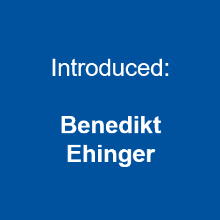On August 1st, Benedikt Ehinger has taken up the SimTech Tenure Track Professorship "Computational Cognitive Science" at the University of Stuttgart. Here you can learn more about him.
Mr Ehinger, perhaps you could introduce yourself briefly. Where do you come from? What have you done so far?
My name is Benedikt Ehinger and I am a brain researcher. I was for a long time in Osnabrück at the Institute of Cognitive Sciences, where I studied and did my doctorate. Last year I was at the Donders Institute in the Netherlands, a research institute for cognitive neuroscience. And now I am in Stuttgart. This is very nice for me as an Upper Swabian: back in Swabia.
You're a cognitive scientist. What are your fields of interest? And in which direction have you done research so far?
My focus is on "seeing". From eye movements to blind spots, everything is included. I also deal a lot with statistical methods, especially with brain waves. These very small brain waves are difficult to measure and interpret, but they allow extremely diverse and unique insights into how the brain works.
What are your plans and goals with the professorship?
Of course, this is not a complete list here, but I am very much looking forward to doing research in an interdisciplinary team. I have many plans for joint projects inside and outside the university. If I could wish for something and think about a period of 10 to 20 years, then I would like to see much more cognitive research, or even an Institute of Cognitive Sciences in Stuttgart. The conditions could not be better - there is a big boost in the direction of artificial intelligence.
What will the theme be?
You don't think about it immediately, but eye movements are the most common movement we do. More than 100,000 a day. And the effects on our vision and brain activity are naturally very large. An eye movement from the desk to the outside is a complete change from what we see. This has fascinated me for a long time and I would like to gain a deep understanding of the cause and effect of our eye movements on our brain. To do this, you have to look at the brain activity during eye movement, of course, and this is exactly where I am at.
My lab will first develop a methodologically sound basis for the analysis of brain wave data under eye movements and other movements (e.g. moving images, but also moving arms, legs etc.). Once this basis is in place, we will move on to the next step of combining the methodologies with cognitive models.
What do you expect from the cooperation in SimTech?
SimTech is very strong in the field of big data and of course simulation. Big data can be obtained very quickly in brain measurements, simulations of realistic brain wave experiments are even more complicated. Here we use more cognitive models, which are after all also a (very simplified) simulation of humans. The combination of both fields is very exciting and promising.
Why did you choose the University of Stuttgart?
A colourful mixture of location, colleagues, opportunities and freedom. I am very happy that many people have decided to give me this chance.
You are offering two doctoral positions. What do potential candidates have to bring along and what can they expect?
They can expect exciting scientific work. For me personally, a strong scientific ethos is very important. Science is not about getting as many publications as possible in the best journals. Robust and replicable studies during the doctorate are usually the greater gain for science. Doctoral students should be given a lot of freedom for their own research and be able to implement their own projects.
Will you offer seminars or lectures during the winter term?
Yes, I look forward to it! There will probably be a course with lectures and exercises on "Signal Processing and Neuroimaging" with a focus on brain wave analysis.
Have you ever been to Stuttgart? Do you know the city?
When I was a child, we went to the "capital" sometimes, the Wilhelma remained in my memory. Later on I sometimes juggled on Königsstraße and earned myself some pocket money, but that was many years ago. Now, of course, I can get to know Stuttgart in a completely different way.
What are you looking forward to?
To exciting students, exciting questions, exciting discussions.
What did you want to become when you were a little boy?
It used to be teacher, then researcher after graduation. So it fits!
Quickly asked:
Movie or book? Book
Mountains or beach? Mountains
Champagne or sparkling water? Sprakling water
Watch sports or do sports? Do
Car or bike? Bike
Cat or dog? Cat
Cinema or concert? Concert
Early riser or night owl? Night owl - forced early riser
Greta or Donald? Greta


